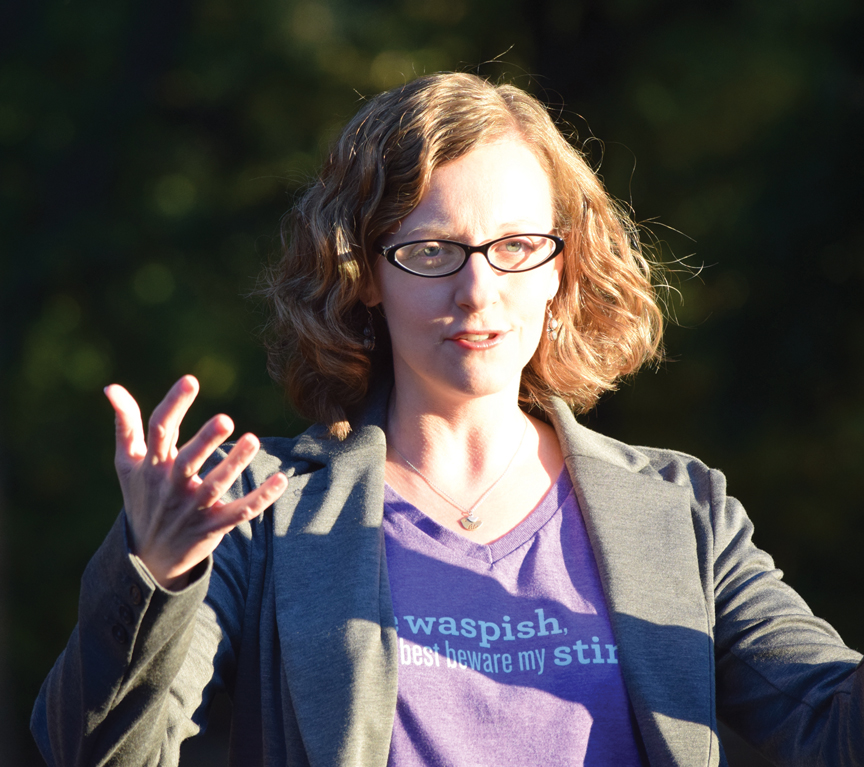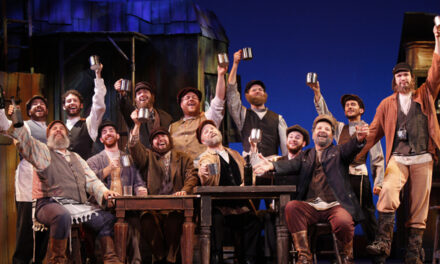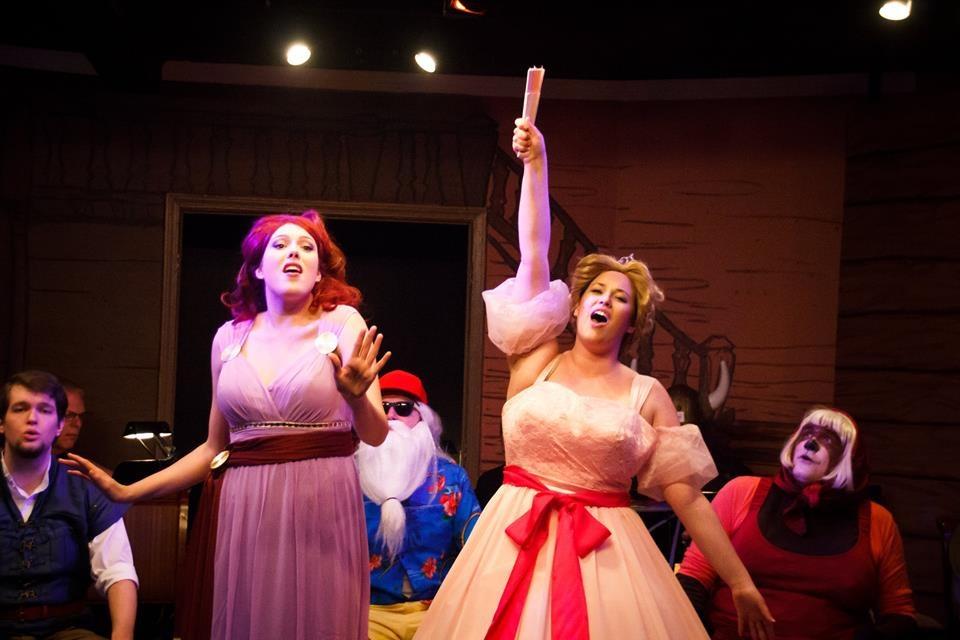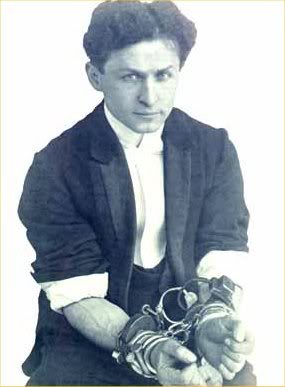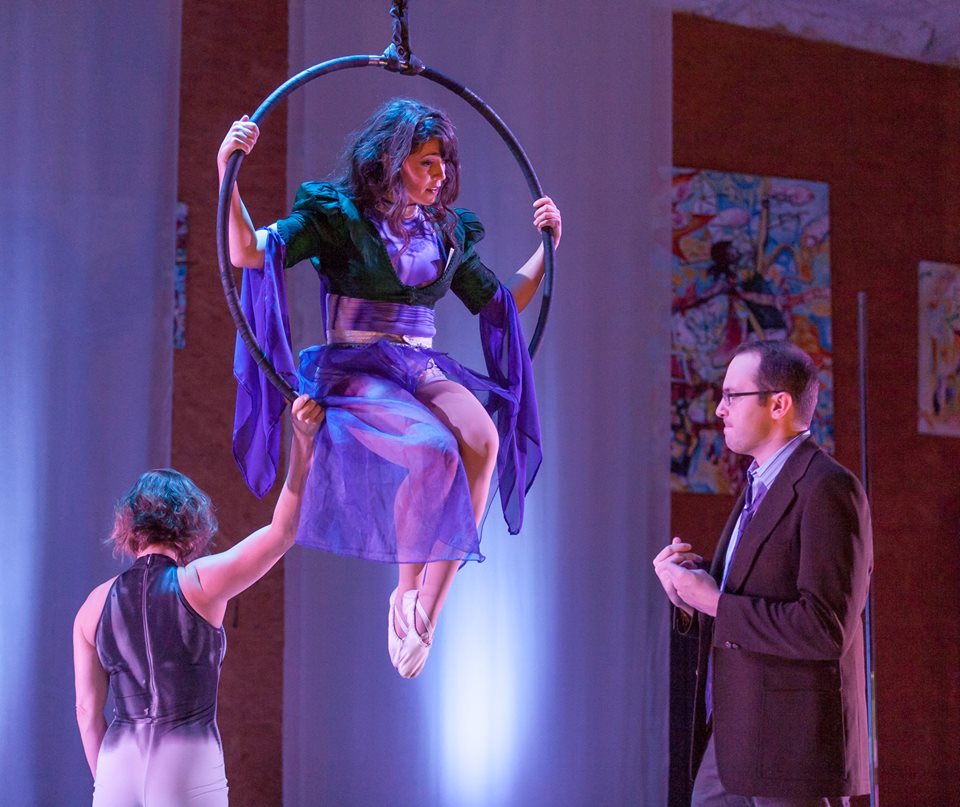“The reason I love contemporary theatre and the reason I love Shakespeare are the same: I love language.” – Amy Attaway
By Scott Dowd
Entire contents copyright © 2017 Fearless Designs. All rights reserved. Used with permission.
For the past four seasons, Kentucky Shakespeare audiences have enjoyed the unique perspectives of director Amy Attaway, who has given us her own takes on classics such as the problematic Taming of the Shrew, The Winter’s Tale and Tom Stoppard’s Rosencrantz and Guildenstern Are Dead. On the day we spoke, Attaway—who recently joined the permanent staff of Kentucky Shakespeare as Associate Artistic Director—was busily overseeing the spring touring performance of Julius Caesar. As the six actors strutted and fretted for just over an hour upon the steps of The Kentucky Center for the Arts, businesspeople, tourists and passersby near the corner of Fifth and Main streets stopped to observe the demise of a tyrant at the hands of his erstwhile followers. This summer, the Louisville native and Ballard High School graduate directs the first of four histories by Shakespeare that tell the story of the breaking apart of the dynasty and the rise of Henrys IV and V. Richard II is the second of three main stage productions scheduled to celebrate fifty-seven seasons of free Shakespeare in Central Park.
Scott Dowd: How did you become interested in the theatre?
Amy Attaway: My parents took us to StageOne plays when we were little. I started taking acting lessons when I was really young and just never stopped.
SD: It’s your first season as Associate Director, a new position for the organization. What are you working on now?
AA: My job is mostly directing, which is wonderful. I directed two of the education tours. These plays go out to schools around the state. As you know, Kentucky Shakespeare Festival is the largest in-school touring provider in the state. We have two pairs of actors who travel the state and perform for classes of all sizes. Then I directed Rosencrantz and Guildenstern Are Dead in the Bomhard Theater. Now we are getting ready for the summer and I will be directing Richard II. We’re launching the Henriad in its entirety. Richard II begins this tetralogy that continues with Henry IV, Part I; Henry IV, Part II; and Henry V. I might not direct them all, but I am conceptualizing all of them as a series. There will be commonalities that make them feel like a set, including a collaboration with Scott Carney of Wax Fang to write original music to tie them all together.
SD: That’s really cool.
AA: It is, and he has been amazing to work with. We’ll have an opening theme for the whole Game of Kings series. Starting next year, we’ll recap the highlights of previous plays in the series and finish with coming attractions. Our sound designer, Laura Ellis, is working with me on that as well, and I know audiences are going to love it. Kentucky Shakespeare has a very small staff, so everybody does a little bit of everything. I’ve also been doing some grant writing, scheduling and logistics.
SD: How many grants might you be producing in a year?
AA: There have been several Matt and I have worked on together, but I have done four or five big ones since I’ve been there. I’ve been writing them mainly to support the Shakespeare with Veterans program, which is a major component of my job.
SD: I’m not familiar with this outreach. Is it relatively new?
AA: Matt started it when I was still freelancing and a guest teacher in February 2016, so it’s just over a year old. I’ve sort of taken it over and run with it since. It’s a free program for military veterans from any branch of the service, any rank, any gender, any age. We have Vietnam-era vets all the way up to more recent ones in the Middle East. We don’t have anyone from the Coast Guard, but every other branch is represented with ranks from brigadier general to specialist.
SD: How often do you meet and what are the goals?
AA: We get together once a week to talk about their experiences, talk about their lives and play some theatre games. We do some acting exercises and then we do Shakespeare. The first year we focused on pieces of different plays that I thought might have resonance for the group. We would dissect the play. Some of them landed and some of them not as much. The ones that landed we took control of and made them into choral performance pieces. It’s really cool. You can see a clip of it on our website. Over the past year, it has grown and grown, so we’ve had performances at IUS, the Central Park stage and a couple of times during the Mayor’s Week of Valor. That’s one of the big programs for which Kentucky Shakespeare is raising money. This year the group has decided to focus its attention on Julius Caesar. It has been really interesting to look at the play in different ways—not just a piece here and a piece there. We are looking at how characters change and develop through the course of the play. They’re starting to choose sides. Some of the vets are all Brutus; others are with Marc Antony. A couple of people are backing Cassius.
SD: Is this a form of art therapy?
AA: It isn’t therapy, but the reports I get are that it has been therapeutic. The participants have all said it has affected how they feel, how they deal with their family, how they deal with their coworkers and how they go through their lives. It’s been incredible.
SD: This isn’t the first project of this type Kentucky Shakespeare has launched.
AA: Shakespeare Behind Bars started as a program of Kentucky Shakespeare but is now its own non-profit. Through Matt, we are still very connected with the work there. We also have programs at the Audubon Youth Development Center and other places around the city. We just recently got a big grant from Metro Government to do some programs in West Louisville in the Zones of Hope, the office of safe and healthy neighborhoods. We have teaching artists out working with kids at community centers in the West End and Portland. We’re just starting a pilot program with the Norton Cancer Institute to do the same kind of work with patients and families that we are doing with veterans and see if that is useful. This is all something Kentucky Shakespeare does that I’m really excited about and that I think is really important.
SD: Kentucky Shakespeare has for a long time been much more than what we see in Central Park, though that remains the organization’s primary identity.
AA: That’s right. We’ll serve about twenty-five to thirty thousand people in the park. All told, throughout the year we will serve almost ninety thousand people through various education and outreach programs.
SD: Let’s do talk about the upcoming season in Central Park.
AA: It opens June 1 with Much Ado About Nothing. This season we will do a comedy, a history and a tragedy. Matt Wallace is directing Much Ado and he has set it in the Regency period so much associated with Jane Austen. The costumes and manners you’ll see in the play will be very familiar to her readers. It’s a resonant play for Matt because he did it with his wife, Tina Jo. I have played Beatrice in my past as an actor, so it’s important to me, too.
SD: Much Ado will run through the middle of June followed, as you have already indicated, by a history that you will direct.
AA: Richard II is one of the lesser known of Shakespeare’s histories—not to be confused with Richard III, which is part of a different tetralogy. Some people say Richard II is the last Plantagenet king. King Edward III had seven sons, five of whom lived to adulthood. None of them became king because the oldest—the heir apparent—died about a year before Edward. So the right of the crown passed to his nine-year-old son, who became Richard II. He had a rough start, and as he grew up he made some poor choices. The play is about the conflict between him and the people who remained loyal to him, and his cousin Henry Bolingbroke, who by the end of the play becomes Henry IV. It’s a beautiful play. It’s the only one of Shakespeare’s histories written entirely in iambic pentameter. There are no buffoon characters, no mechanicals, but it sets us up for Henry IV, Part I, where we meet Falstaff, prince Hal and Pistol who carry us through to the wild action of Henry V.
SD: Tell me more about your journey to Shakespeare.
AA: I started out as an actor, went to the University of Evansville and, when I came back to Louisville after brief stops in New York and Cincinnati, I worked five years at Actors Theatre as the associate director of the apprentice/intern company—now the Professional Training Company. While I was there, I dived head first into new plays and commissioning playwrights, work-shopping new plays and also directing in the Humana Festival.
SD: What an amazing thing for you—or anyone—to have on their resume.
AA: Not only for my resume, but for the experience of doing it, all the people I met, the playwrights I was able to work with and the relationships I was able to develop throughout the national theatre community. While I was there, I started my own company, Theatre [502], with a few colleagues with the mission of doing second productions and regional premieres.
SD: Will you still be able to do that with your new responsibilities?
AA: It’s harder now, but I’m one hundred percent committed to it. It is a part of my passion. I really thought the next step in my career would be to become a freelance director based in Louisville. I didn’t know if that would work, but my goal after that was to be the associate director of a small company, which at the time I thought would mean leaving Louisville. I said to everyone, “I don’t want to leave Louisville, but we’re going to see how it goes.” I had two gigs out of town right after I left Actors; I had coffee with Matt Wallace in October of that year and he offered me Henry V as a guest director. Then he asked me back three subsequent summers. Now I’ve landed as the associate artistic director of a theatre in Louisville—which is this amazing miracle!
SD: Having worked in contemporary and classical theatre, do you find any difference in the types of people who are drawn to one over the other?
AA: What I’ve learned over the last few years is that it is all part of the same love. The reason I love contemporary theatre and the reason I love Shakespeare are the same: I love language. I have reverence for language and I like finding the true and right way to communicate it. Because I can now do both with Theatre [502] and Shakespeare, I can approach Shakespeare as I would a new play and approach the new plays like they’re Shakespeare.
SD: A good director really can affect your understanding of and appreciation for Shakespeare. I notice it more with classical theatre, but the way a director frames the scene and the choices the actors make can dramatically change the way I understand what the author is trying to communicate.
AA: That is absolutely true. That was one interesting adjustment I’ve made in my thinking about theatre. I feel that my job as a director of contemporary theatre is just to make sure the playwright’s voice is heard and to make sure I’m telling his or her story to this audience with these actors. But with Shakespeare, I feel like I have an additional responsibility to make sure I’m bring the text to life in a new way, with a specific point of view. When I’m working on a contemporary play, I don’t want the director’s hand to be seen. I don’t necessarily want it to show in my work with Shakespeare, but I spend more time thinking about what I want to say. Taming of the Shrew was a good example of this. I knew I had to do something with this play to help contemporary audiences understand it in a deeper way. Now, envisioning this Game of Kings cycle is similar for me.
SD: Why is that?
AA: Because I’m working to envision it as a series. I’m talking to a lot of smart people, doing a lot of research to make sure this ancient history comes alive in a way that feels immediate and exciting for our contemporary audience in the park, when it’s ninety degrees.
SD: Do you have to guard against bringing too much contemporary shorthand into the play?
AA: I think it depends on the production. Most of what I have done so far with Kentucky Shakespeare has been pretty traditional Renaissance. This play is more Medieval because it’s set in 1399. Julius Caesar in modern dress can be really evocative for contemporary audiences. The only time when it feels dangerous to me is when it’s sloppily done, when it’s inconsistent. All of us at Kentucky Shakespeare work really hard to be thorough in our envisioning of whatever we’re doing.
SD: To be clear, Matt has not set this production of Julius Caesar in modern times?
AA: No, the final production of the summer will take us back to 44 BCE, togas and all. It will be fully of the period.
SD: You, Matt and the rest of the staff have been very successful in enhancing the festival atmosphere in the park. What will be some of the highlights this summer?
AA: We have a new playground this season. The stage house that has been there for twenty-five years was not built to last that long. It was a wonderful place, but it was falling apart. So we took it down and Paul Owen, who designed that original set, has come up with a new concept for the theatre. It does a lot of great things and it does them while embracing nature. The stage house was great, but it covered up our center tree. The new uprights that block the trailers are made of greenery and start behind that tree. So our stage has grown again! The bar, Will’s Tavern, will be back, fully stocked with Brown-Forman products. Our gift shop keeps getting better every year and we have a great partnership with the Louisville Food Truck Association, so there will be food trucks at the park every night. The food trucks and the bar open at 7 p.m. We will have strolling performers who mingle with the audience, including some giant puppets—William Shakespeare and Queen Elizabeth! On the weekends you may see jugglers and fire-eaters. Every night we have a pre-show performed by a different community group. Dance schools, bands, all different kinds of performers from throughout the community will participate. Jewish Community Center, one of our community partners, will be doing a full run of Kiss Me Kate! Louisville Ballet will also be performing a full run again, including another newly choreographed work. Both organizations were huge hits last summer. The Louisville Improvisors will be back with Late Night Shakes and, for the first time, Cincinnati Shakespeare will be coming down to perform Merry Wives of Windsor for two nights. This is our 57th season of presenting free Shakespeare in the Park, but we are working to keep the experience new and fresh every time you come out!
You can find more information about Kentucky Shakespeare events, tours, programs and summer camps for ages 4–15 at their website, www.kyshakespeare.com.
Scott Dowd has a wealth of experience working within and commenting upon the arts scene in Louisville. He has been involved with Kentucky Opera, the Louisville Orchestra, and Louisville Public Media. His talents and experience include: Actor; Director; Singer; Musician; Radio and Television Interviewer; Classical and News Jock; Public Speaking; Public Relations; Marketing; Development; Writer; Substantive Editor. He currently serves on the Board for Arts-Louisville.com.

